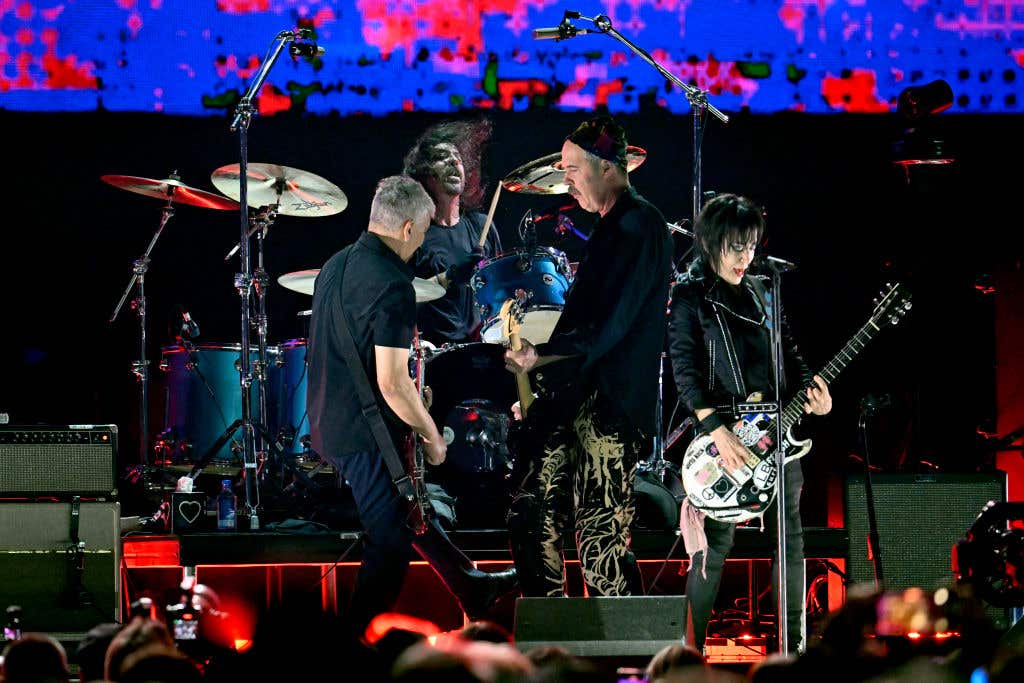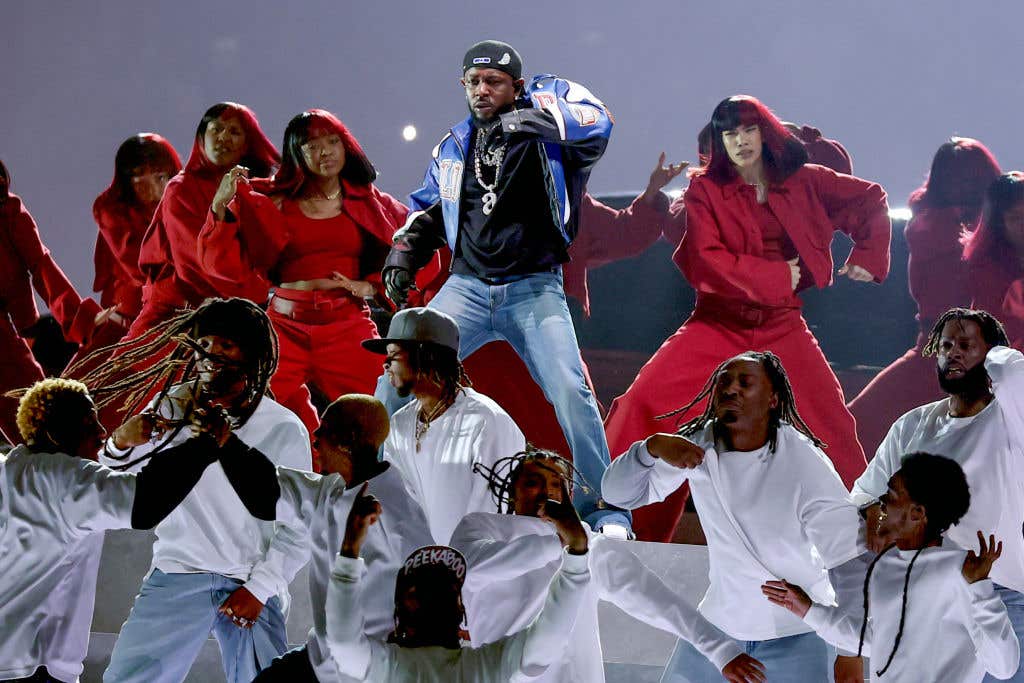A New Beginning Marks the End of Magic Number
NIrvana, politicized cities, and the value of apprenticeships take the stage in the final Three Is a Magic Number.

Joan Jett (R) performs onstage with (L-R) Pat Smear, Dave Grohl, and Krist Novoselic of Nirvana during the FIREAID Benefit Concert for California Fire Relief at The Kia Forum on January 30, 2025 in Inglewood, California.
Photo by Scott Dudelson/Getty Images for FIREAIDWelcome to what I imagine will be the final edition of my Three is a Magic Number column. I’m not stepping away or stepping down, but have decided (as we revamp and refresh the Augusta Today web presence) to discard the gimmick of three related stories and focus more on those things that have camped out in my consciousness. Sometimes it may be three things. Sometimes it may be one. Perhaps it is my response to a local or national story. Perhaps it is something more personal. I’ve always believed a column, when it is really firing on all cylinders, should be less about one person preaching to the collective whole and more the opening gambit in an ongoing conversation. So, while we do have a Magic Three this week, consider this the exception and not the rule.
Let’s talk.
Here we are now, entertain us
Watching a (sort of) reformed Nirvana play with a clutch of notable female rockers at the FIREAID Fire Relief concert a few weeks ago, I was struck by how well that band’s sound – wild and unkempt while remaining deep in the groove – had held up over the years. It still felt immediate and cathartic and I was happy, in that moment, to spend a few minutes with an act that had, at one time, meant a lot to me.
I thought that was the end of it. The band’s magnetic lead singer Kurt Cobain was still dead and these reunions, although not unheard of, remained very rare. So long Nirvana, see you in another decade or so.
Fast forward to last Friday’s SNL 50 concert and, again as an unannounced surprise, the band took the stage. This time, self-professed superfan and casually country superstar Post Malone stepped in, playing and singing on a too short and very sharp “Smells Like Teen Spirit.”
Two appearances in as many weeks. Both deeply satisfying. It’s no surprise the rumor mill has cranked up with those desirous fans calling out for a probably Post-led reunion tour. Personally, I don’t see it happening. Post Malone has his own busy schedule – and upcoming tour – to navigate. And while Foo Fighters seem particularly quiet these days, that band is Nirvana drummer Dave Grohl’s regular day job. The band has also missed the window for festival and summer tour season, a particularly lucrative times for acts of Nirvana’s arena-filling stature. Perhaps they could wait until 2026, but I suspect the momentum gained by the two recent performances will have cooled considerably by then.
So no, I do not believe there will be a Nirvana tour, which is a shame, because that band’s brand of tuneful punk-inspired rock could not have arrived at a better time.
What’s interesting about Nirvana is that, despite having primarily played in the punk rock sandbox, it was never a politically motivated act. There were no songs about foreign policy or disreputable presidents or social causes. Nirvana wasn’t political. The band’s music documented what it felt like to feel unheard and unseen. It was about internal struggle and, more often than not, the pain that comes from feeling powerless.
It was about frustration.
That feels like an idea worth exploring. We live in divisive times, with people feeling particularly tribal. The Right is frustrated with the Left. The Left is frustrated with the Right. Any episodes of civil discourse that manage to occur feel more accidental than purposeful. And if that sort of endemic frustration has a soundtrack, it just might be the caustic clatter of Nirvana. Are you frustrated? So are we. It doesn’t matter why. Let us all rage together.
Thirty years after the fact, Nirvana feels like music for the times.
Not everything is political
Recently, I read what seemed like a pretty innocuous article in the New York Times. The conceit was a list of several family-friendly Spring Break destinations – Washington D.C., Portland, Savannah, Montreal, and Mexico City - for people not interested in a beach vacation. Innocent enough.
Except when it came to the comments. A rational reader might expect people to mention their own favorite spots, or perhaps attractions in the communities mentioned they either embraced or avoided.
Not the case.
Portland, Oregon was pronounced a Sodom of Leftist Thought, unworthy of mention and certainly to be avoided come vacation time. Likewise, readers insisted they would never visit Savannah because of Georgia’s decidedly Republican voting history – like buying a beer on River Street meant tacit approval of political doctrine. This was a travel piece, and its most controversial stance was the unstated idea that not everyone likes sand in their pants. What it became was a battleground, with both sides battling over political real estate that, in the end, made no difference. It was fighting for the sake of turmoil.
I suppose there are those that might make an argument in favor of or against visiting a given locale because of its government’s political leanings. I, for instance, have no plans to spend a few days in North Korea. But that’s not what this story was about. It certainly was not what the comments should have been about.
Political discussion – and debate - is important. But there is a time and place for everything – and it’s probably not beneath a story about how nice the museums are in Washington D.C.
The apprentice
Growing up, my understanding and idea of what it meant to be educated was narrow and ill-defined. I believed that to be educated, you had to go to school, and that going to school meant receiving, at very least, a four-year college degree. I’m not sure where this idea came from. My father had a degree in engineering from the University of Washington (Go Huskies), but beyond that, our family had not produced a lot of college graduates.
None, in fact.
That’s not to say there were not very smart and highly successful people lurking in the branches of my family tree. Engineers, architects, real estate investors, even tugboat captains – all a part of my family’s history and all without a college degree. A few, including the tugboat captain, had very little formal education at all. They didn’t have a formal education – but that doesn’t mean they were not educated.
On the contrary, my family’s back pages are filled with readers who are self-educated, experimenters who learned by trial-and-error and, most significantly, apprentices.
Once upon a time and not all that long ago, an apprenticeship – learning at the hands of someone who had already mastered a profession – was a pretty common thing. Learning by doing was accepted as a pretty streamlined way to pass knowledge from one generation to the next. And while apprenticeships – and their more corporate cousin the internship – still thrive and survive, there seems to be a stigma associated with people who choose this educational route. It’s foolish really.
The truth is, almost everyone learns by doing. A teacher may have a degree, but the learning starts when the step in front of a classroom full of kids. A civil engineer can pore over classroom blueprints and case studies for years, but until they are called on to ensure the plumbing plumbs, they haven’t really learned a thing.
I am of the belief that apprenticeships not only need to become more common, but also embraced. Let those that have landed the opportunity to learn from an expert be congratulated, because there’s a big gap between attaining knowledge and attaining skills.
![augustatoday.com logo@4x[324] augusta today logo](/_next/image/?url=https%3A%2F%2Faugustatoday.com%2Fuploads%2F2024%2F08%2Faugustatoday.com-logo%404x324.png%3Fauto%3Dwebp&w=3840&q=75)





